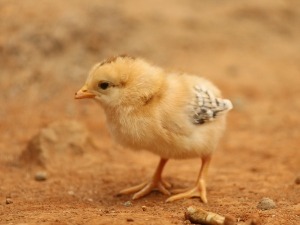
Baby chicks are very fragile animals, there are a variety of things that can quickly, and easily, kill a baby chick.
Not only are baby chick immune systems not fully developed, which can cause them to fall ill to a variety of illnesses, but they are fragile and can be killed with not much force.
If your baby chick’s body starts to look odd, if it develops, or has, a swollen abdomen, then you’d be right to be worried. This article looks into it.
Table of Contents
Baby chick swollen abdomen:
If you’ve hatched a number of chicks, and you realize that one of the chicks has a swollen abdomen, then you’d be right to worry. If your bird’s abdomen is swollen then the baby bird likely has omphalitis or mushy chick disease.
What is Omphalitis (mushy chick disease)?
Omphalitis, a yolk sack infection, or, mushy chick disease develops when a chick becomes infected with a bacterium and its abdomen swells up.
The eggshell is porous, this means that gases and moisture can enter the shell and the membranes in the shell. Unfortunately, the bacteria that cause mushy chick can also get into the eggshell and the membranes.
If the bacteria that cause this condition namely: coliforms, Staphylococcus, Streptococcus, and Proteus reach the egg then the bacteria will enter the shell and then enter the yolk.
The yolk contains all the nutrients that bacteria need to grow. The warm and humid conditions in the incubator also allow the bacteria to flourish.
The chick’s immune system cannot fight this bacteria off, so the infection grows.
Once the bird is about to hatch, the yolk, infection included, is absorbed into the bird’s body, and the bird’s body closes, and the bird will hatch with a swollen abdomen. The bird now has omphalitis or mushy chick
This swollen abdomen will be filled with blood vessels and a brown fluid.
Bacteria can also infect birds that have hatched but hatched with an unclosed navel. Bacteria will enter the bird’s open navel and when the bird’s abdomen closes it will seal the bacteria in and cause the bird to develop omphalitis.
Unfortunately, this disease has a high rate of mortality, birds that have this disease can die within 2 weeks of hatching. If the bird does not die early in life, then the bird will grow up stunted and won’t do very well overall.
Other symptoms:
In addition to your little bird having a swollen abdomen, other symptoms of mushy chick include:
- Anorexia
- Naval inflammation
- Labored breathing
- Occasional coughing
- Listlessness
- Reduced weight gain
- Diarrhea
- Ruffled feathers
- Increased mortality
Causes:
If the incubator is not sanitized before use, and bacteria get into the incubator before you add the eggs, then the chicks in the egg can develop mushy chick disease.
In addition, handling eggs, when your hands aren’t clean, and incubating eggs that are not clean, can cause this illness.
Chicks that are not hatched in a sterile environment can also develop this illness if their navels are not fully closed when they hatch.
Incubating eggs in temperatures that are too low will cause birds to hatch with an open navel leaving room for bacteria to get into.
If the humidity, during incubation, is too high, then the yolk will grow to be too large. If this happens, then the bird’s body won’t be able to fully close around the yolk leaving an opening for bacteria to get into.
Is it contagious?
Thankfully, this disease is not contagious, a sick chick cannot give this disease to a healthy chick.
However, some chicks who have this illness will not show signs of having it but will still be sick even though you can’t see it.
Note: The bacteria that causes this illness can be spread to humans as well, you won’t get this disease in particular but you can still become infected with this bacteria and get sick.
What to do:
The best thing you can do is to take your bird to the vet. The vet will examine the bird and offer medications. The vet will likely give your bird medication in the form of antibiotics.
Giving the bird electrolytes and multivitamins may also help, but your vet may advise that you cull the bird if it is severley infected and if it does not respond to treatment.
A bird that does not respond to treatment may die even though it’s been offered antibiotics.
If you enjoyed this article then you may also be interested in other chicken related articles. Here are some articles that you may be interested in: Newly Hatched Chick Bleeding, Shrink Wrapped Chick, Baby Chick Not Growing Feathers, Sticky Chick, Chick Hatching With A Dry Membrane

